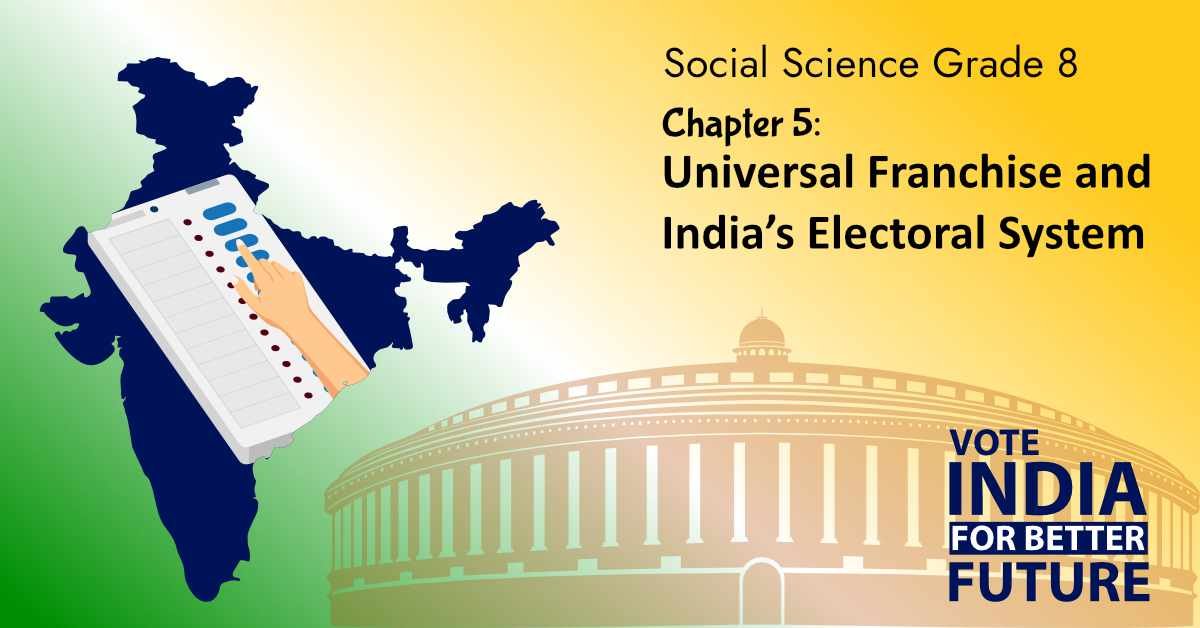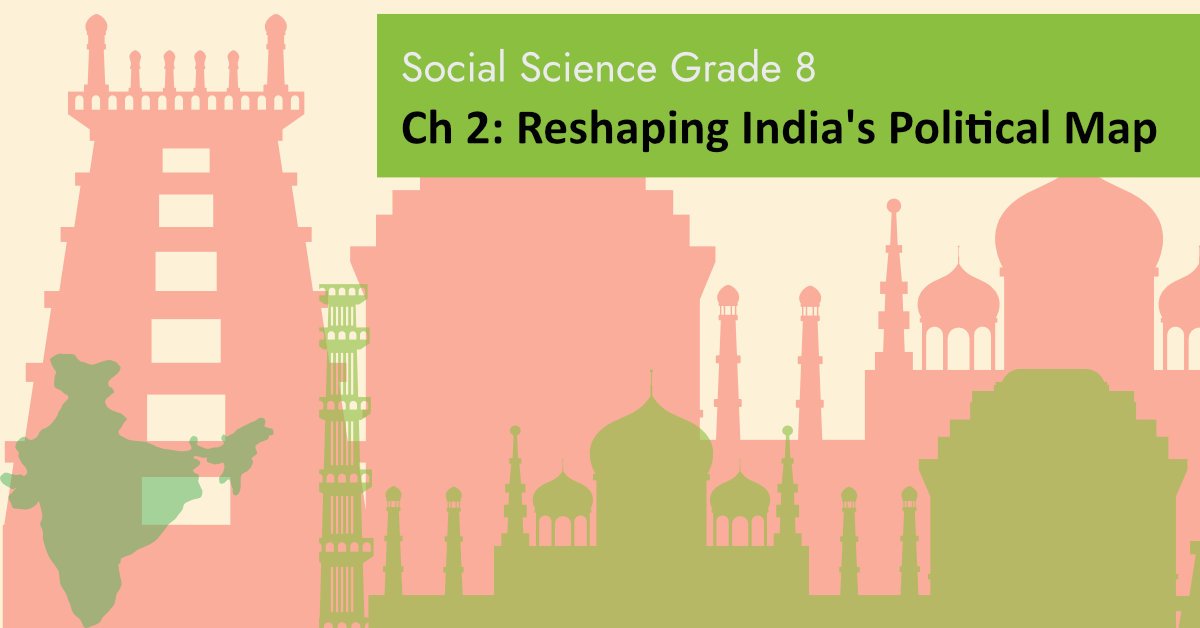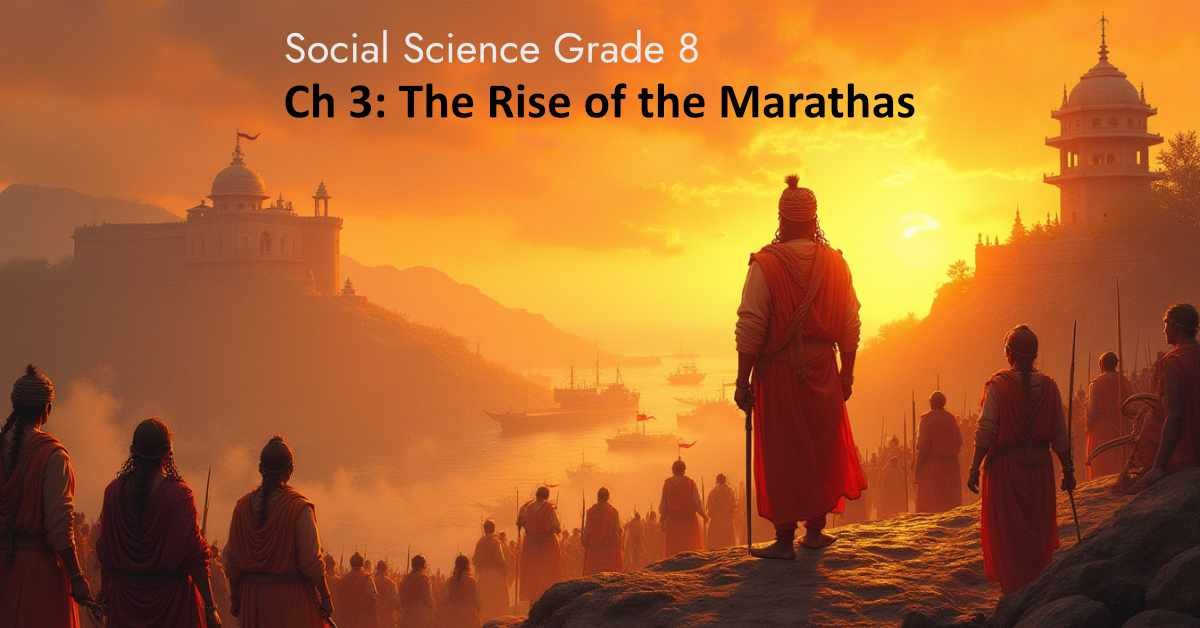The Exploring Society India and Beyond Class 8 Chapter 5 Universal Franchise and India’s Electoral System explores the importance of voting, the role of the Election Commission of India (ECI), and the challenges faced by our democracy.
India is the world’s largest democracy, and its strength lies in the principle of universal adult franchise — the right of every citizen above 18 years to vote, regardless of caste, creed, gender, religion, or economic status.
Universal Franchise and India’s Electoral System Worksheet
Elections in India are often called the “festival of democracy”, because they give ordinary citizens the power to choose their representatives and decide the future of the country. The Election Commission of India (ECI) ensures that elections are free, fair, and transparent. It manages an enormous process involving nearly a billion voters, millions of polling staff, and lakhs of polling stations spread across the country.
Every vote counts equally — whether it is cast by a farmer in a small village, a worker in a factory, or a student who has just turned 18. Thus, the right to vote is not just a right but also a responsibility.
Need help with textbook questions? Get our free Class 8 Social Science NCERT Solutions – packed with Q&A, MCQs, fill in the blanks, and more. Perfect for revision, homework, and exam preparation! Join us on WhatsApp to access more worksheets and study resources.
Also Download:
Social Science Worksheets Class 8
Science Worksheets for Class 8 Curiosity
Hindi Worksheets for Class 8 Malhar
Maths Worksheets for Class 8
Universal Franchise and India’s Electoral System class 8 Notes
Universal Adult Franchise
- Every citizen of India above 18 years has the right to vote (Article 326).
- All votes have equal value, regardless of caste, religion, gender, income, or education.
- India reduced the voting age from 21 to 18 in 1988.
- Before independence, only about 13% of Indians could vote.
Importance of Universal Franchise
- Ensures equality – one person, one vote.
- Strengthens democracy by allowing everyone to participate.
- Holds representatives accountable to the people.
- Encourages civic engagement.
- Removes barriers of discrimination.
India’s Electoral System
- Direct elections → Lok Sabha, State Assemblies, Local bodies.
- Indirect elections → Rajya Sabha, President, Vice-President.
- Lok Sabha elections → First-Past-the-Post system (candidate with most votes wins).
- Rajya Sabha elections → Single transferable vote system by MLAs.
- President → Elected by MPs & MLAs (electoral college).
- Vice-President → Elected by MPs (both houses).
Role of the Election Commission of India (ECI)
- Independent constitutional body established in 1950.
- Conducts free and fair elections to Parliament, State Assemblies, President, and Vice-President.
- Fixing election dates.
- Enforcing Model Code of Conduct (MCC).
- Registering political parties.
- Managing voter lists and polling process.
Voting Process in Lok Sabha Elections
- Voter ID checked and name verified.
- Finger inked and signature taken.
- Ballot chit given, finger checked again.
- Vote cast through EVM (with VVPAT slip).
- NOTA option available.
Model Code of Conduct (MCC)
- No misuse of government resources.
- Campaigning must be peaceful.
- No announcement of new schemes to influence voters.
- No gifts, cash, or inducements to voters.
Challenges in India’s Electoral System
- Low voter turnout in urban areas.
- Influence of money and muscle power.
- Candidates with criminal records.
- Voter apathy.
The Way Forward
- Strong voter awareness campaigns.
- Transparency in political funding.
- Use of technology (EVM, VVPAT, online voter registration).
- Youth participation in elections.
Social Science class 8 Chapter 5 Question Answer
Q1. What is universal adult franchise?
Ans. Universal adult franchise means that every Indian citizen aged 18 years and above has the right to vote, irrespective of caste, gender, religion, education, or income.
Q2. Why is the secret ballot important in a democracy?
Ans. The secret ballot ensures privacy and prevents voters from being influenced, threatened, or bribed. It guarantees free and fair elections.
Q3. Give one difference between Lok Sabha and Rajya Sabha elections.
Ans. Lok Sabha members are elected directly by citizens, while Rajya Sabha members are elected indirectly by MLAs of state legislative assemblies.
Q4. Explain the role of the Election Commission of India.
Ans. The ECI conducts free and fair elections in India. Its major functions include:
- Setting election dates.
- Enforcing the Model Code of Conduct.
- Registering political parties.
- Supervising the voting process with transparency.
- Introducing reforms for voter participation and accessibility.
Q5. Explain the election of the President of India.
Ans. The President is elected indirectly by an Electoral College consisting of:
- Elected MPs of Lok Sabha and Rajya Sabha.
- Elected MLAs of states and Union Territories (Delhi & Puducherry).
- The single transferable vote system is used. Nominated members do not vote.
Class 8 Social Science Chapter 5 MCQs
Q1. Which Article of the Constitution provides for universal adult franchise?
a) Article 370
b) Article 326
c) Article 21
d) Article 80
Q2. The minimum age to vote in India is:
a) 18 years
b) 16 years
c) 21 years
d) 25 years
Q3. The Election Commission of India was established in:
a) 1947
b) 1949
c) 1950
d) 1952
Q4. Which system is used in Lok Sabha elections?
a) Proportional representation
b) Single transferable vote
c) Cumulative vote
d) First-Past-the-Post
Q5. Who elects the President of India?
a) Only MPs
b) Only MLAs
c) Electoral College (MPs + MLAs)
d) People directly
Answers:
b) Article 326
a) 18 years
c) 1950
d) First-Past-the-Post
c) Electoral College (MPs + MLAs)



